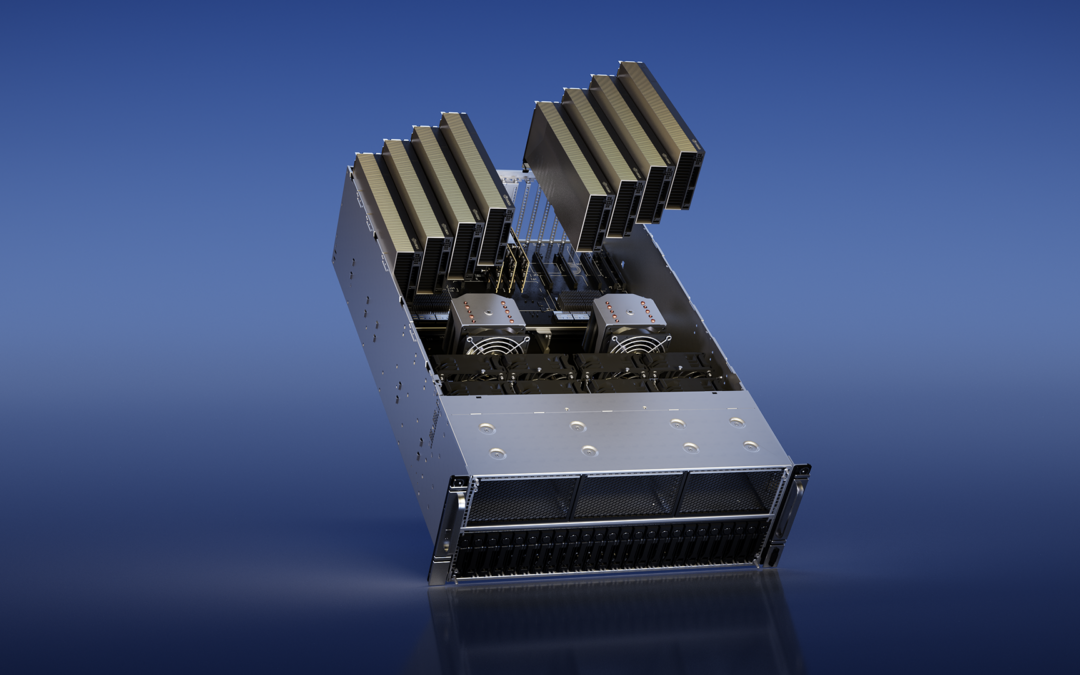Cutting-edge ASUS ESC8000 and ASUS ESC4000 servers
In the ever-evolving landscape of technology, innovation is the key to staying ahead of the curve. ASUS, a renowned name in the world of computing and electronics, has once again proven its commitment to pushing the boundaries of what’s possible. The latest announcement from ASUS has sent ripples of excitement through the tech community, as the company unveils its cutting-edge ASUS ESC8000 and ASUS ESC4000 servers, equipped with the advanced NVIDIA L40S GPUs.
The fusion of ASUS’s expertise in server technology with NVIDIA’s cutting-edge graphics processing power is a remarkable milestone in the world of data centers and server solutions. Let’s dive into what makes these servers so impressive and why they’re generating such buzz.
Powerful Processing with NVIDIA L40S GPUs
At the heart of these new servers lies the NVIDIA L40S GPU, a powerhouse designed to deliver exceptional performance for data-intensive tasks. NVIDIA’s GPUs have long been recognized for their prowess in graphics processing, machine learning, and artificial intelligence, making them a natural fit for the demands of modern server applications.
The advanced NVIDIA L40S GPUs incorporated into ASUS’s ESC8000 and ESC4000 servers offer enhanced computational capabilities and improved energy efficiency. This means that businesses can now harness the power of accelerated computing to tackle complex workloads with greater ease and speed. Whether it’s scientific simulations, AI training, rendering, or any other GPU-intensive task, these servers promise to significantly boost productivity and reduce processing times.
Impressive Scalability and Reliability
One of the standout features of ASUS’s ESC8000 and ESC4000 servers is their scalability. These servers are designed to accommodate the evolving needs of businesses and data centers, allowing for easy expansion as demands grow. This scalability is particularly crucial in today’s dynamic IT landscape, where adaptability is a key factor in staying competitive.
Moreover, ASUS has always been synonymous with reliability, and these servers are no exception. They come equipped with robust components and a meticulously engineered cooling system to ensure optimal performance and long-term durability. ASUS’s commitment to quality and reliability is backed by years of experience in delivering top-notch computing solutions.
Efficiency and Sustainability
In addition to their impressive performance and reliability, ASUS’s ESC8000 and ESC4000 servers are also designed with energy efficiency in mind. Data centers consume vast amounts of electricity, making sustainability a pressing concern. These servers incorporate power-saving features and intelligent management tools that help optimize energy consumption without compromising performance. This not only reduces operating costs but also contributes to a more eco-friendly data center infrastructure.
The Future of Data Centers
ASUS’s unveiling of the ASUS ESC8000 and ASUS ESC4000 servers featuring advanced NVIDIA L40S GPUs marks a significant step forward in the realm of data centers and server technology. These servers promise to empower businesses and data centers with the computational muscle needed to tackle the challenges of today’s data-driven world.
As industries continue to evolve and adopt more data-intensive applications, the demand for high-performance computing solutions is greater than ever. ASUS’s commitment to innovation ensures that these servers will be at the forefront of meeting these demands, providing businesses with the tools they need to thrive in a rapidly changing digital landscape.
In conclusion, ASUS’s announcement of the ESC8000 and ESC4000 servers is a testament to their dedication to excellence and innovation. By combining the power of NVIDIA’s L40S GPUs with their own server expertise, ASUS has created a solution that promises to redefine the capabilities of data centers and server technology. As businesses continue to harness the potential of advanced computing, these servers are set to play a pivotal role in shaping the future of data centers and the industries they support.

